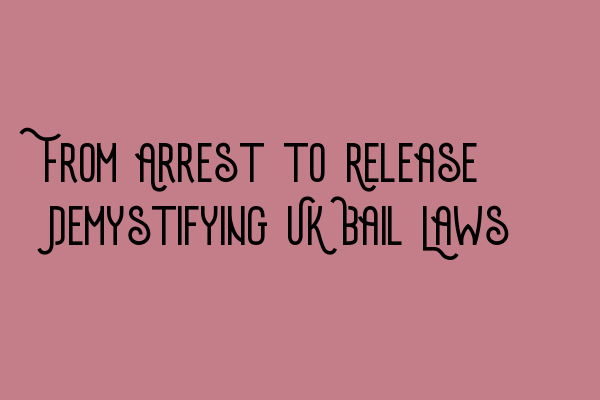From Arrest to Release: Demystifying UK Bail Laws
When someone is arrested and facing criminal charges, one of the key concerns is whether or not they will be granted bail. Bail ensures that individuals are not held in custody unnecessarily and allows them to continue their daily lives until their trial. Understanding the UK bail laws can help demystify the process and provide clarity to those who find themselves in this situation.
The Basics of Bail
In the UK, bail is a legal process that allows individuals accused of a crime to be released from custody until their trial. It is an essential element in the criminal justice system, as it upholds the principle of innocence until proven guilty. The decision to grant bail is made by the police at the time of arrest or by the courts during subsequent hearings.
However, bail is not automatically granted to everyone. The court takes various factors into consideration when deciding whether to grant bail or remand a defendant in custody. These factors include:
- The seriousness of the offense
- The defendant’s criminal record
- The risk of the defendant absconding
- The risk of the defendant interfering with witnesses
- The defendant’s ties to the community
It is important to note that bail can come with conditions imposed by the court, such as surrendering passports, reporting regularly to a police station, or refraining from contacting certain individuals.
The Bail Process
The bail process begins at the time of arrest. When a person is arrested, the police have the power to decide whether to release them on bail or keep them in custody until their court appearance. In less serious cases, the police are more likely to release the individual, while in more serious cases, the decision may be handed over to the court.
If the police decide to grant bail, they will set conditions that must be met by the defendant. Failure to comply with these conditions can result in the bail being revoked, and the defendant being returned to custody.
Once the case reaches the court, the decision on bail becomes the responsibility of the judge or magistrate. They will consider the factors previously mentioned and decide whether to grant bail or remand the defendant in custody until their trial.
Bail Hearings and Variations
During a bail hearing, the defense will have the opportunity to present arguments in favor of granting bail. They may highlight the defendant’s stability, their ties to the community, and their willingness to comply with any conditions set by the court.
If bail is granted, it is important to understand that it can be subject to variations or conditions being imposed at a later stage. This can occur if new information comes to light that may affect the defendant’s risk level or likelihood of showing up for court. Likewise, the prosecution can also apply for bail to be revoked if they believe the defendant poses an increased risk to the public or witnesses.
Working with an Experienced Solicitor
When facing criminal charges and potential bail hearings, it is crucial to have professional legal representation to guide you through the process. At SQE Criminal Law & Practice Law UK, our team of expert solicitors has extensive experience in navigating the complexities of UK bail laws.
Our solicitors understand the factors that courts consider when deciding on bail and can provide comprehensive advice tailored to your specific case. We will work diligently to present a strong bail application on your behalf, ensuring that your interests are protected throughout the process.
If you require legal assistance or want to learn more about bail laws in the UK, don’t hesitate to contact SQE Criminal Law & Practice Law UK. We are here to assist you.
Related Articles:
- SQE 1 Practice Exam Questions
- SQE 1 Practice Mocks FLK1 FLK2
- SQE 2 Preparation Courses
- SQE 1 Preparation Courses
- SRA SQE Exam Dates
